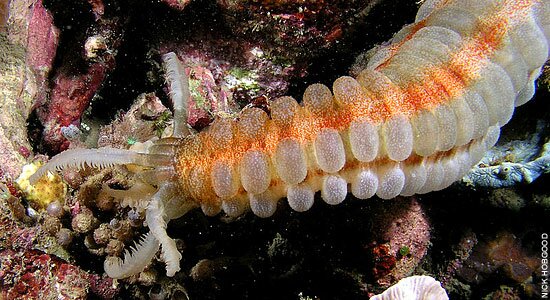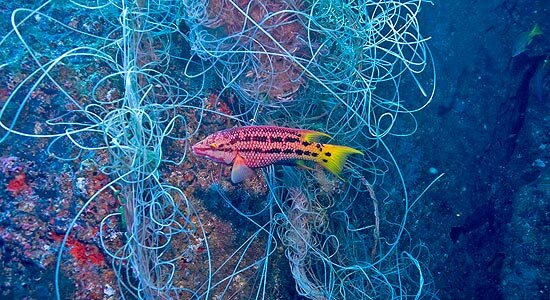Tag Archive for 'FAO'
The humble sea cucumber is under increasing threat worldwide, a new report warns.
- Sea cucumbers: a global review of fisheries and trade - UN FAO report
- UN FAO
Increasing demand for the cucumber – once a cheap and staple food of the poor, but now fashionable in expensive restaurants – is piling pressure on already depleted stocks.

Sea cucumber feeding at night off the Indonesian coast
The UN’s Food and Agriculture Organisation (FAO) warns in its report that sea cucumber populations across the globe, from Asia to the Galapagos, are in trouble and most high value commercial species are already depleted.
In a majority of countries looked at by the FAO and in the African and Indian Ocean regions, stocks are overfished. Similarly, in the Asian Pacific region the most sought-after species are largely depleted. Continue reading ‘UN report: Sea cucumbers face overfishing threat’

Nearly half of all fish produced for food is now farmed rather than caught in the wild, a new UN report reveals.

The biennial State of World Fisheries and Aquaculture (Sofia) report shows that stocks continue to be depleted by overfishing
The amount of fish produced by farming rose in the past two years while the number of wild fish stocks ranked as over-fished, depleted or fully exploited increased to 80 per cent of the world’s stocks.
The figures released in Rome by the United Nations Food and Agriculture Organisation (FAO) indicate that the amount of fish caught at sea has reached a plateau and may be in decline when suspected over-reporting by China is taken into account.
On the other hand, the amount of fish raised by aquaculture rose to 47 per cent of all produced for food. Continue reading ‘Farmed fish set to overtake wild caught fish for first time’

Fish must be exploited less heavily if they are to adapt to climate change, according to the UN Food and Agriculture Organisation.
Responsible fishing practices need to be more widely adopted to tackle over-fishing and fishery management plans should include strategies for coping with rising sea temperatures.
“Best practices that are already on the books but not always implemented offer clear, established tools towards making fisheries more resilient to climate change,” said Kevern Cochrane, one of the authors of The State of World Fisheries and Aquaculture (Sofia), 2009.
“So the message to fishers and fisheries authorities is clear: get in line with current best practices, like those contained in FAO’s Code of Conduct for Responsible Fisheries, and you’ve already taken important strides towards mitigating the effects of climate change.”
Climate change is already altering the distribution of both marine and freshwater species with warmer-water species being pushed towards the poles and experiencing changes in habitat size and productivity, the report says.
It is also affecting the seasonality of biological processes and altering marine and freshwater food sources which has unpredictable consequences for fish production.
A decrease or loss of locally available fish stocks will pose serious problems for communities which depend on abundant supplies for their livelihood.
“Many fisheries are being exploited at the top range of their productive capacity. When you look at the impacts that climate change might have on ocean ecosystems, that raises concerns as to how they’ll hold up,” said Cochrane.
Vulnerable communities who rely on their fishing and aquaculture industries need to take urgent action to strengthen their resilience to climate change, the report urges.
The authors of the report say that fisheries and aquaculture make a minor but significant contribution to greenhouse gas emissions during fishing operations and the transport, processing and storage of fish.
The average ratio of fuel to carbon dioxide (CO2) emissions for capture fisheries is estimated at about 3 teragrams of CO2 per 1m tonnes of fuel used.
“That could be improved. Good fisheries management can substantially improve fuel efficiency for the sector,” Cochrane said.
“Overcapacity and excess fishing capacity mean fewer fish caught per vessel - that is, lower fuel efficiency - while competition for limited resources means fishers are always looking to increase engine power, which also lowers efficiency.”
Much of the industry’s carbon footprint comes in the transport of the fish, particularly by air, once they have been harvested.
Intercontinental airfreight emits 8.5 kg of CO2 per kilogram of fish transported. This is about 3.5 times that for sea freight and more than 90 times that from local transportation of fish where it is consumed within 400 kilometres of catch.

Hungry sharks have attacked three people in the past three weeks off Sydney, Australia.
One of the explanations offered by the BBC is that cleaner waters and a ban on commercial fishing, which has attracted more fish to the area, could be responsible for luring the oceans’ big predators closer to Sydney’s beaches and harbour.
That is an extraordinarily cynical explanation, if you think about it, and one the BBC should be ashamed for reporting.
If you follow the logic of the Australian source quoted by the BBC, it would be safer to go polluting the sea until the water turns brown and to have fish exterminated within miles of the shore so that at least you aren’t attacked by sharks. Bruce, do me a favour.
There is a much more plausible explanation contained in the two-yearly report on the state of the world’s fish stocks published today by the UN Food and Agriculture Organisation (FAO).
The report shows that the number of the world’s fish stocks ranked as over-fished, depleted or fully exploited increased to 80 per cent – a rise of three per cent in two years.
The only sensible explanation for this is the world’s fishing fleets remain out of control and politicians are unaware or unwilling to do something about the problem.
Check out another report today, Hungry Oceans: What happens when the prey is gone?, compiled from scientific sources by the environmental group Oceana. This shows that scientists around the world are reporting ocean predators emaciated from lack of food, vulnerable to disease and lacking the energy to reproduce.
Scrawny dolphins, whales, tuna and bass have been reported along coastlines around the world.
At the same time, we continue to hunt their prey, the small fish such as herring, menhaden, anchovy and sand eel which the major predators depend on, to provide feedstock for the fast-growing fish farming industry. We have forgotten to leave enough fish in the sea for predator fish.
Isn’t lack of food the most likely explanation for the strange behaviour of sharks off Sydney?
And isn’t the creation of larger areas, offshore, where the bounty of the sea can recover a more plausible way of solving the problem than allowing the seas off Sydney to get polluted again and over-fishing to resume?


![]()



